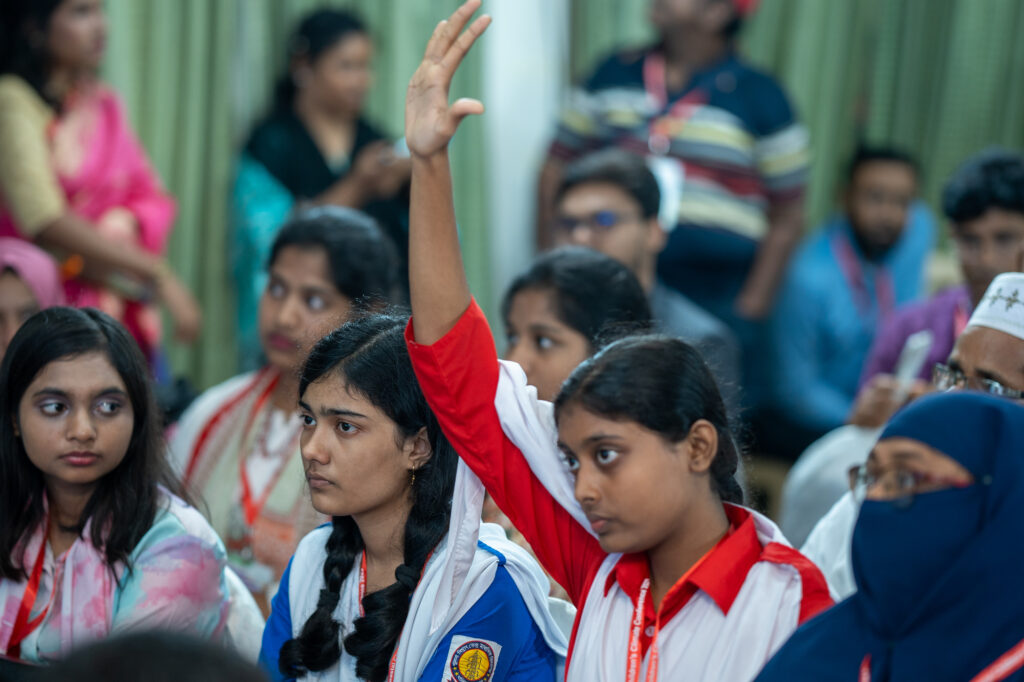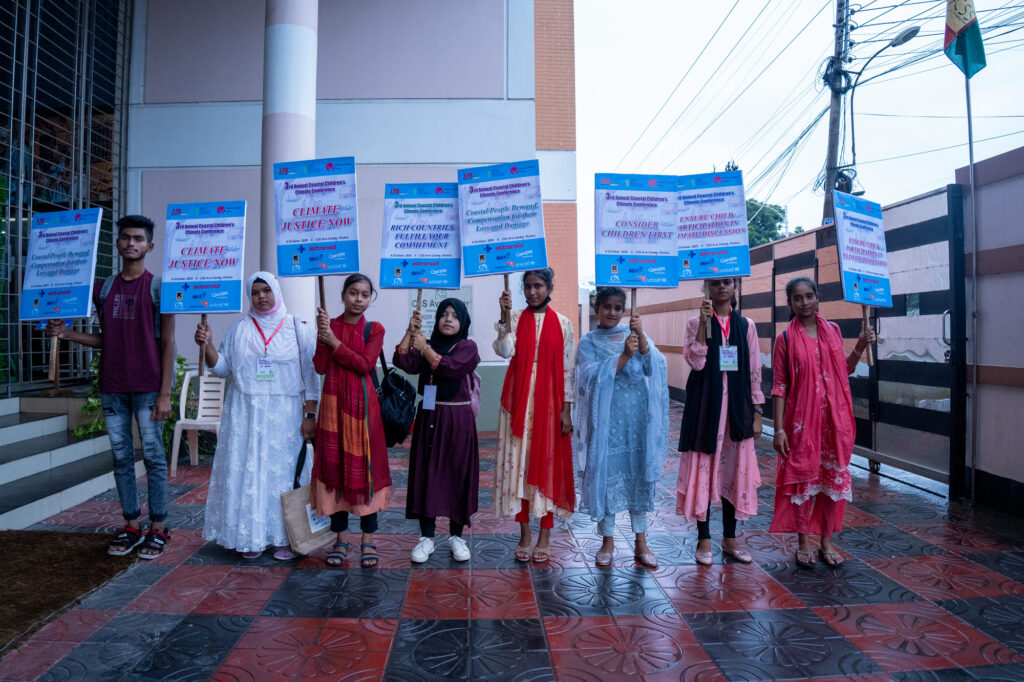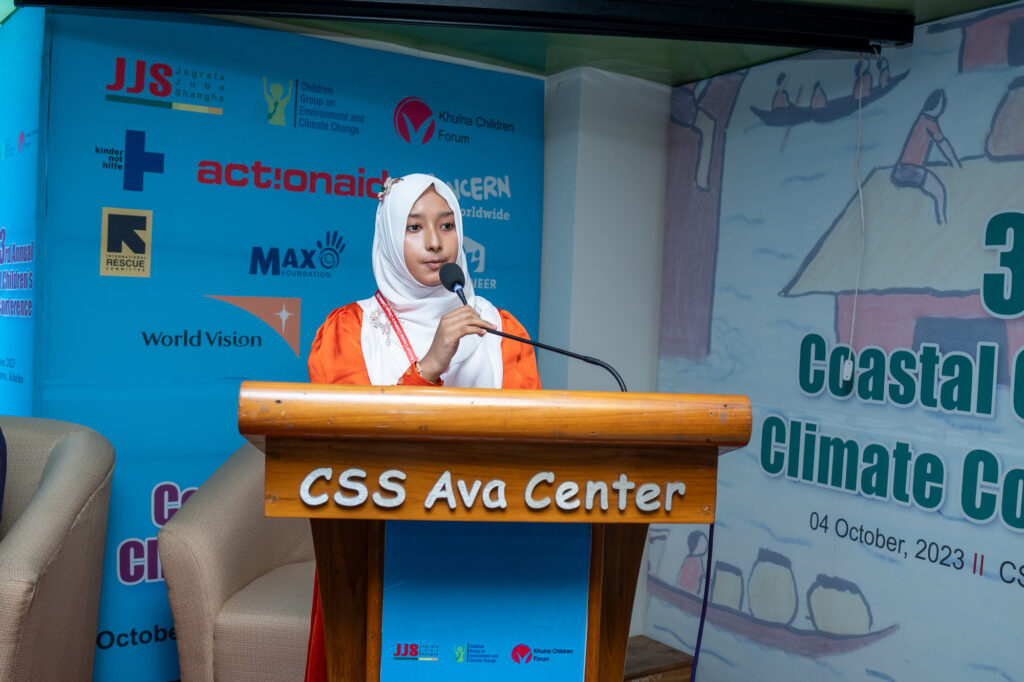- Tel: +8802477730146, +8802477726173
- Email: atmzakir@gmail.com
The 3rd Annual Coastal Children Climate Conference in Khulna on October 4th brought together over 350 attendees, including 150 children, and various stakeholders. Mayor Alhajj Talukdar Abdul Khaleque emphasized the climate risks faced by Khulna, calling for collaborative efforts. The panel discussion included representatives from government, NGOs, and children, addressing topics like children’s roles in climate challenges, disaster management, and regional connectivity. There were five thematic technical sessions including Child Leadership, Climate Change and Protection of Children with Disability, UNFCCC-Loss and Damage Fund, Plastic, Toxic Chemicals, and Climate Change and Climate Impact on Urbanization.

In the 1st technical session on child leadership, chaired by Dr. Ashiq Ur Rahman of Khulna University, presenters provided valuable insights into children’s roles in addressing climate change and disaster management. Dr. Tuhin Roy from Khulna University emphasized the importance of involving children in decision-making, highlighting their pivotal role as stakeholders. Shamim Arefin, Executive Director of AOSED discussed the physical and psychological effects of climate change on children, advocating for a shift to child leadership. Subarna Barma from the International Rescue Committee highlighted the adverse effects of disasters on children, emphasizing the need to address their specific needs. Development consultant Masum Talukder stressed the necessity of including children in climate change and disaster plans, proposing strategies for their participation. Dr. Ashiq Ur Rahman concluded by encouraging children to share their perspectives, highlighting the value of their opinions. The 2nd technical session, led by Prof. Dr. Mollah Shafiqur Rahman from Khulna University, focused on “Climate Change and Protection of Children with Disability.” The discussion centered on the impact of climate change on children, particularly those with disabilities, and highlighted international efforts addressing this issue. Faisal Ahmed emphasized the crucial role of nutrition and healthcare for children under 5. Khan Motahar Hossain called for societal cooperation to create a safe environment for children with disabilities, and speakers like Mr. Shafiqul Islam and Hasna Hena underscored the vulnerability of women and children to climate change, advocating for equal rights and specific facilities and tools for children with disabilities in cyclone shelters. Dr. Md. Golam Rabbani, Head of the Climate Bridge Fund Secretariat at BRAC, facilitated 3rd technical session and discussed the current issues related to the UNFCCC process and the growing importance of loss and damage as a thematic area. Mr. Rabbani emphasized the growing financial gap in addressing loss and damage, the need for more funds, and the questions of which countries will contribute, who will receive, and how the funds will be raised. The discussion also involved questions from students and further insights from other panelists, including Kazi Zaved Khalid Pasha, Md. Atiar Rahman, and Nazmul Alam David, focus on issues related to carbon emissions, local assessments, accountability, and access to funds. Mohammad Mahmudul Hasan discussed the changing climate patterns in Khulna, emphasizing the impact on the region and the role of CFC gases from fossil fuels.3rd Annual Coastal Children’s 06 Climate Conference-2023 Khulna, Bangladesh The 4th technical session on “Climate Change Impact on Urbanization: Khulna Context” was led by Tusar Kanti Roy, Head of Urban and Regional Planning at KUET. The session featured specific presentations by Md. Riad Hossain from the Institute of Disaster Management at KUET and Dr. Zakir Hossain, Professor in Urban and Rural Planning at Khulna University. The panel also included Swapon Guha, Executive Director, Moshiur Rahman, Programme Manager from Concern Worldwide, Bangladesh, and Gouranga Nandy, Bureau Chief of Daily Kaler Kantho, who actively participated in the discussion sessions. The session likely focused on the impacts of climate change on urbanization in the context of Khulna, addressing various aspects and challenges related to this issue. The 5th technical session, chaired by Prof. Dr. Md. Rafizul Islam, KUET addressed the issue of plastic pollution and its environmental impact. Dr. Islam emphasized the importance of raising awareness among children, highlighting the crucial role of teachers in this effort and advocating for children’s participation on scientific and international platforms. Rabeya Sultana, Assistant Professor at Khulna University, discussed global plastic consumption and its environmental consequences, proposing a shift to a circular economy with a focus on recycling, reuse, and repair. The session participants resonated with the importance of reducing plastic usage, promoting eco-friendly alternatives, and calling for stricter government regulations to enforce sustainable practices. Children at the event emphasized the need for awareness campaigns and education to mitigate the harmful effects of plastic on the environment and human health. Children participated in speech and quiz competitions, sharing insights on climate change’s impact. The closing session emphasized children’s rights and involvement in climate change discussions. Awards were given to children showcasing their understanding through drawings. In the end, children’s demands were addressed from the point of view of coastal children forum members on alternative education continuation during an emergency, resilient farming, child-friendly cyclone shelter facilities, safe drinking water access, special attention to people with disability in emergency response, reduction of plastic use, increase funding for local level initiatives, protection of girls from gender-based violence during disaster emergency, climate migrant inclusion in urban services, inclusive DRR, etc. The JJS-led initiative facilitates collaboration, knowledge sharing, and awareness-raising for a resilient coastal region and empowers future generations. The regional conference aims to serve as a bridge between local and international platforms, advocating for climate change and DRR issues to protect coastal people’s rights in Bangladesh.

